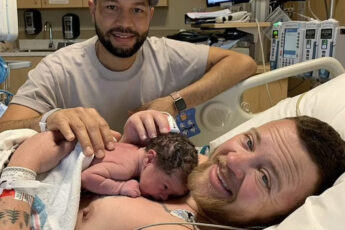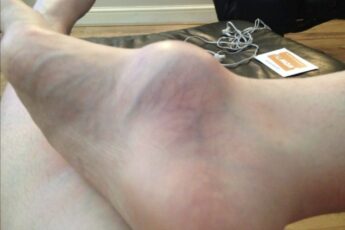The snow had begun falling hours before, soft at first, then heavier, until the city itself seemed trapped inside a swirling snow globe. Neon lights flickered through the storm, headlights blurred into glowing streaks, and the world rushed past without noticing the silence hiding beneath the storm.
Near the edge of a deserted park, where benches lay buried under white drifts, something stirred.
In the back seat of a glossy black sedan, a man sat scrolling through his phone. His coat was pressed, his tie perfect, his watch gleaming with quiet power. Everything about him spoke of wealth and control — except the restless impatience in his eyes.
“We’re late,” he muttered, tapping the glass.
But then — he froze.
His gaze shifted toward the frosted window. There, in the blur of falling snow, moved a figure. Small. Fragile. Barely more than a shadow.
“Is that… a child?” he whispered, half to himself.
The driver looked up. “Sir?”
But the businessman wasn’t listening anymore. Because what he saw didn’t make sense.
A boy — thin, ragged, maybe seven years old — was staggering through the snow. His shoes were torn, his coat no match for the bitter cold, but he kept walking, each step slow and deliberate, as if powered by something greater than strength alone.
And in his arms… not something.
Someone.
Three tiny shapes, bundled beneath threadbare blankets, pressed close to his chest. Babies. The boy clutched them like fragile treasures, shielding them from the storm with all that he had left.
The businessman felt his breath catch. For a moment, his wealth, his meetings, his perfect schedule — all of it disappeared. There was only the boy, the storm, and the unbearable sight of those trembling arms carrying lives too small to survive the night.
“Sir… should I keep driving?” the chauffeur asked quietly.
The man’s voice came out stronger this time, though his chest ached with something he hadn’t felt in years.
“No. Stop the car.”
The brakes squealed against the ice. Without hesitation, he pushed the door open, and the cold struck him like knives against his skin. His polished shoes sank deep into the snow. For the first time in a very long time, he felt human again.
The boy came closer, his lips blue, his legs shaking. But he did not stop. He walked with the solemn determination of a soldier — each step a fight against the storm, against fate itself.
Who was this child?
Where had he come from?
And why was he carrying three fragile lives through the blizzard?
The businessman didn’t know the answers yet. He only knew one thing:
This was not something you drove past.
This was not a moment to ignore.
This was the kind of moment that split life into “before” and “after.”
He stepped forward, snow crunching beneath his feet, the wind howling in his ears. Something inside him — something long buried beneath money, power, and pride — cracked wide open.
He didn’t yet realize that this boy, shivering and half-buried in snow, was about to change everything he thought he knew about life. About love. About what it means to truly save someone.
He only knew he had to act.
The boy kept walking, eyes down, too cold to notice the man stepping into his path.
And then, at last, someone finally spoke the words the child had been waiting to hear his whole life:
“Wait… let me help you.”
The boy stopped at the sound of the man’s voice. For the first time, his eyes lifted. They were wide, dark, and filled with something far older than seven years of life should ever hold — exhaustion, fear, and a desperate will to keep moving.
His arms trembled beneath the weight of the tiny bundles pressed against him. One of the infants let out a weak cry, muffled under the thin blanket.
The businessman stepped closer, his own breath clouding in the frozen air.
“Son,” he said softly, “you can’t stay out here. You’ll freeze.”
The boy shook his head, clutching the babies tighter. His lips trembled as he whispered, almost inaudible over the wind:
“They’re my sisters. I have to keep them warm.”
The words struck the man like a blade. For years, his world had been contracts, meetings, profit margins — things measured in numbers, not heartbeats. But here, in front of him, was a child carrying more responsibility than most men ever would.
The driver hurried out, pulling his scarf tighter. “Sir, we should—”
But the businessman raised a hand. He knelt down in the snow, lowering himself until his eyes were level with the boy’s.
“You’ve done enough,” he said gently. “You’ve been so brave. Let me help now.”
The boy hesitated, as though surrendering the burden meant failing. Then, slowly, shakily, he let the man pull aside the blankets. Three tiny faces appeared, their skin pale, their breaths shallow.
Without another word, the businessman shrugged off his own expensive coat, wrapping it around the children with trembling hands. The warmth of the wool swallowed their fragile forms.
“Get the heater running,” he barked at the driver, his voice sharp with urgency.
Within moments, the car doors opened, spilling golden warmth into the night. The boy climbed in first, still holding one of his sisters tight, refusing to let go until the others were safely cradled inside. The businessman slid in after them, pulling the door shut. The storm faded to silence, muffled beyond the glass.
For a long moment, no one spoke. The boy’s eyes never left his sisters, his small chest rising and falling too fast. The man, still catching his breath, could only watch.
And then it hit him: this wasn’t chance. This wasn’t an interruption to his busy schedule. This was a calling.
“Where are your parents?” he asked softly.
The boy shook his head. Tears welled in his eyes, though he tried to blink them back. “Gone,” he whispered. “It’s just us now.”
The businessman’s throat tightened. He looked at the boy — skinny, shivering, still holding on as if the world depended on him — and he felt something crack deep inside his chest. Something he hadn’t felt in decades.
He reached out and placed a steady hand on the boy’s shoulder.
“Not anymore,” he said. His voice broke, but he didn’t care. “Not anymore. You’re safe now. All of you.”
The boy blinked, uncertain, as though the words were too big to believe. But then, for the first time that night, his shoulders eased. His grip softened. He leaned slightly, almost instinctively, into the warmth beside him.
The car pulled away, tires crunching over the snow. And as the city lights blurred past, the businessman stared out the window — but all he saw was the boy, the babies, and the undeniable truth:
Money could buy houses, cars, entire companies. But it could not buy this moment.
It could not buy the raw, humbling grace of being given a second chance at humanity.
That night, a wealthy man thought he was simply stopping his car.
In reality — he was stopping his life from running away without meaning.
And in the quiet warmth of that backseat, he knew with certainty:
The boy had saved him just as much as he had saved the boy.







